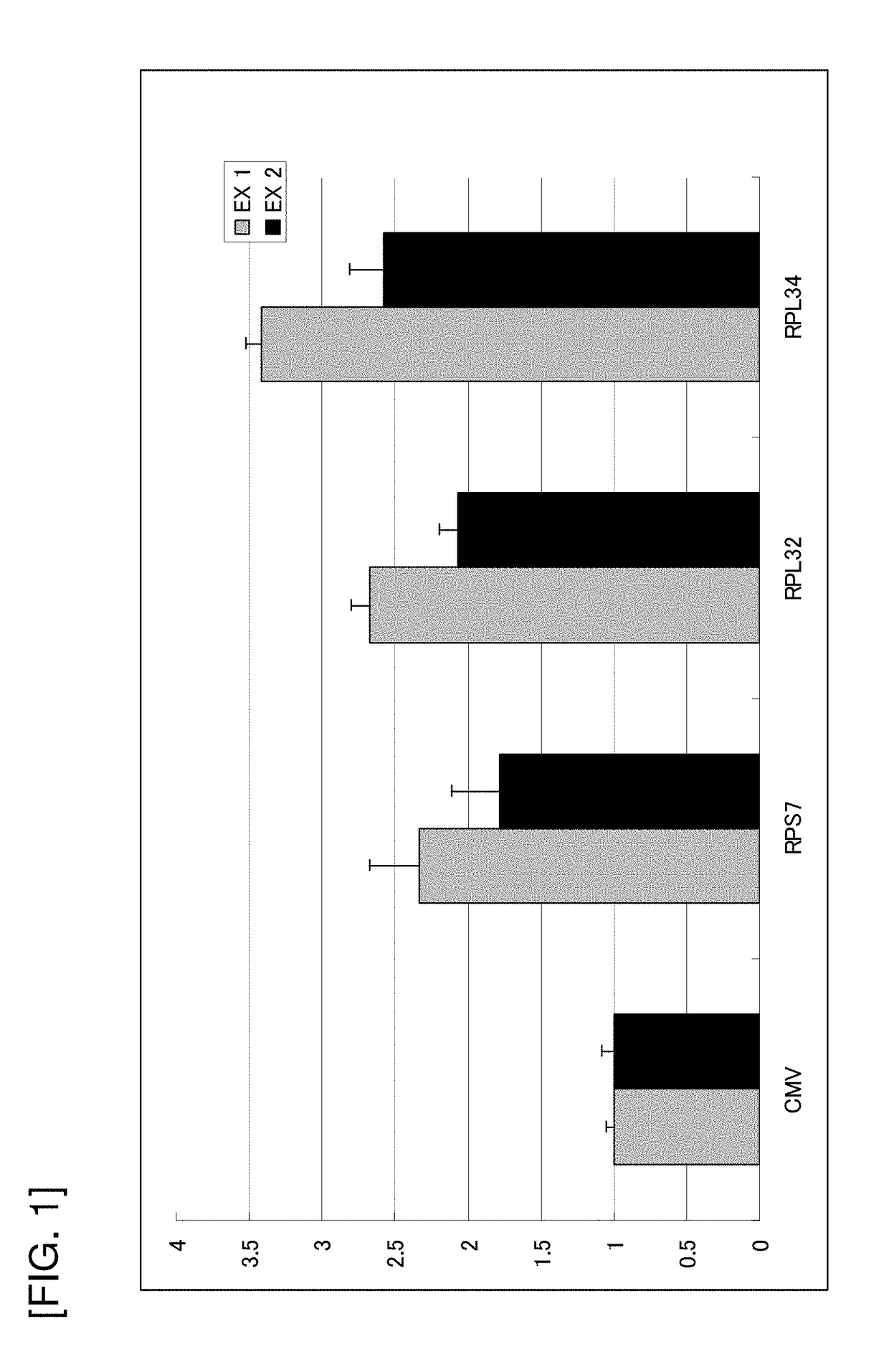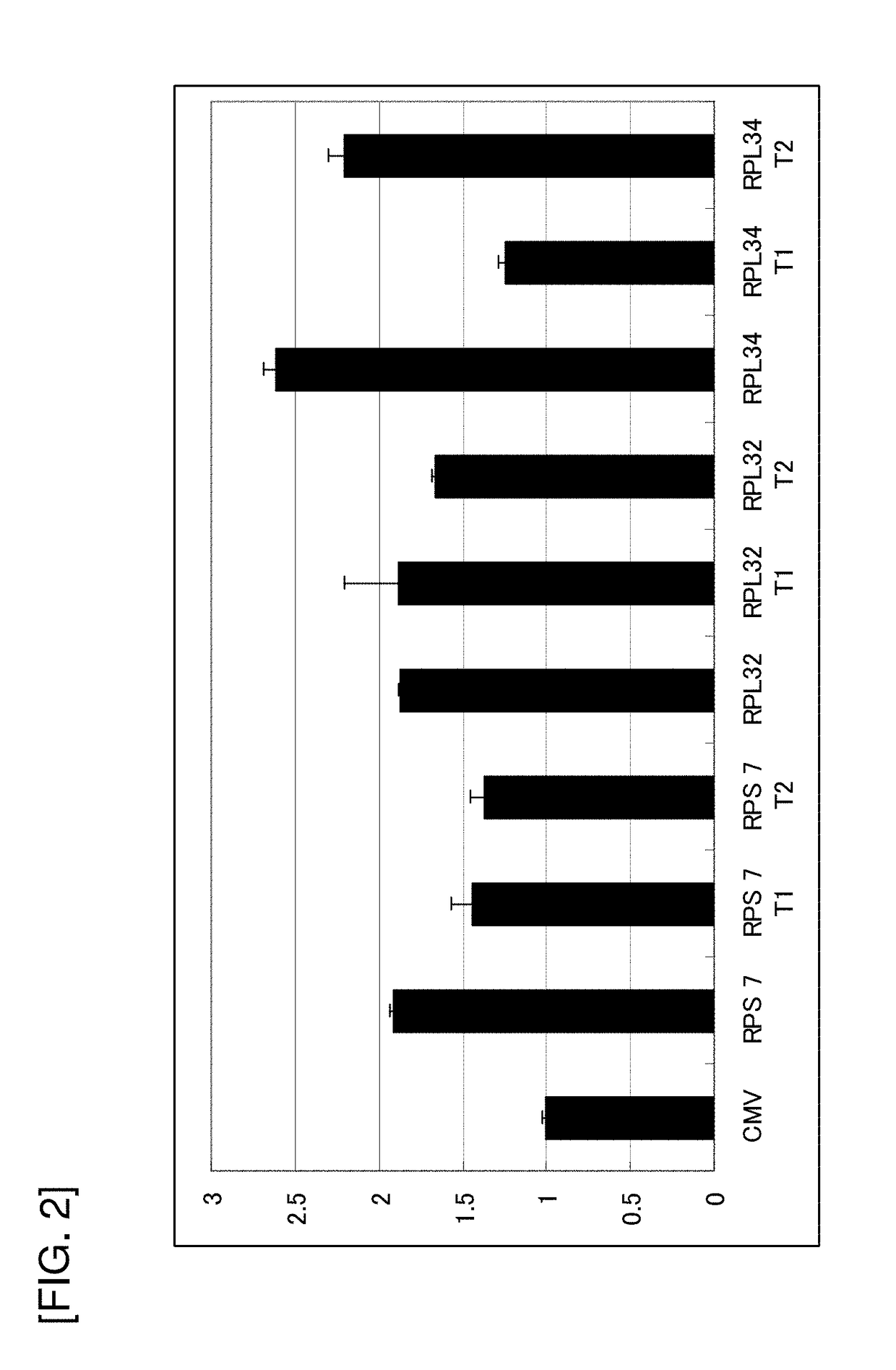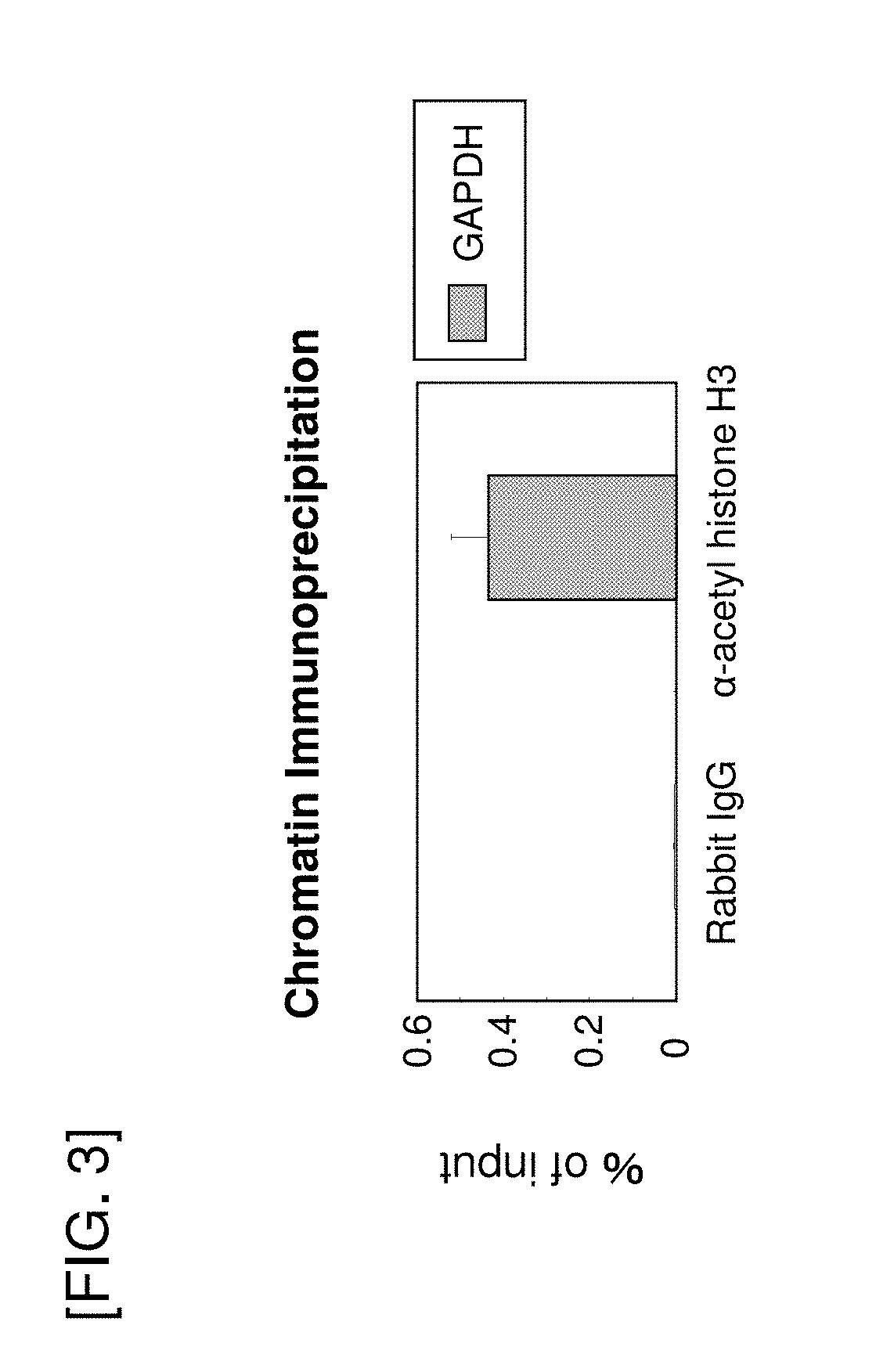Promoter derived from human gene
a technology of promoter and human gene, which is applied in the field of promoter derived from human gene, can solve the problems of low growth rate, inconvenient, complex post-translational modification of microorganisms, etc., and achieve the effects of significant antibody or the like, and further enhancement of expression of foreign genes of therapeutic proteins
- Summary
- Abstract
- Description
- Claims
- Application Information
AI Technical Summary
Benefits of technology
Problems solved by technology
Method used
Image
Examples
example 1
Construction of Vector CMV / pSeapIRESpuro for Use in Evaluation of Promoter Activity
[0143]The evaluation of promoter activity was performed by using the expression of SEAP as an index, and a vector for use in the evaluation was constructed.
1-1) Amplification of cDNA of SEAP by PCR and Addition of Restriction Enzyme Site
[0144]The cDNA of SEAP was amplified by PCR using primers in which an NheI site was added immediately upstream of the start codon ATG, and a BglII site was added immediately downstream of the stop codon and KOD-Plus-(TOYOBO). As a template, pSEAP2-control (Clontech) was used. The obtained fragment was digested with NheI and BglII, and then purified using a MinElute Reaction Kit (Qiagen).
[0145]
The used primers:(SEQ ID NO: 17)SEAPF: AAAGCTAGCATGCTGCTGCTGCTGCTGCTGCTGGGCC(SEQ ID NO: 18)SEAPR: AAAAGATCTTCATGTCTGCTCGAAGCGGCCGGCCGC
1-2) Construction of CMV / pSeapIRESpuro
[0146]After a pIRESpuro3 (Clontech) vector was digested with NheI and BamHI, the SEAP fragment prepared in 1-...
example 2
Cloning of Promoter Regions of RPS7, RPL32, and RPL34
[0147]As human genes considered to contain a promoter having a high transcriptional activity, EEF2, YBX1, PPIA, PSAP, RAN, RPL32, RPL34, RPLP1, RPS7, RPS24, TMSB4X, UBC, YWHAE, ARPC2, and SERBP1 were selected by using mRNA level as an index, and cloning of the promoter region of each gene was performed. The obtained plasmids were used for the evaluation of promoter activity in Example 3.
2-1) Cloning of Promoter Region of RPS7
[0148]As the promoter region of RPS7, with reference to the mRNA sequence registered under accession number NM_001011.3 in GenBank, a sequence starting at a nucleotide located about 2 kbp upstream of the transcription start site and ending at a nucleotide immediately upstream of the nucleotide sequence corresponding to the start codon sequence of RPS7 was used.
[0149]The promoter region of RPS7 was amplified by PCR using E. coli artificial chromosome clone RP11-644P19 (GenoTechs) as a template, and also using t...
example 3
Evaluation of Promoter Activity Using Expression Level of SEAP in Transfected CHO-K1 Polyclonal Cells as Index
3-1) Transfection
[0158]CHO-K1 cells (ATCC) were subcultured in 5% CO2 at 37° C. using F-12 nutrient mixture medium (GIBCO) containing 10% Ultra-Low IgG FBS (GIBCO).
[0159]The CHO-K1 cells were seeded onto a 6-well plate (IWAKI) at 5×105 cells / well. On the subsequent day, 2 μg of each of CMV / pSeapIRESpuro, RPS7 / pSeapIRESpuro, RPL32 / pSeapIRESpuro, RPL34 / pSeapIRESpuro, or the like constructed in Examples 1) and 2) was transfected using Lipofectamine 2000 (Invitrogen).
3-2) Antibiotic Selection with Puromycin
[0160]Two days after transfection, the cells were collected from the 6-well plate by a trypsin treatment, the total amount of the collected cells was seeded into a 6-cm dish (Nunc), and also puromycin (Clontech) was added to the medium at a final concentration of 8 μg / ml to start antibiotic selection.
3-3) Evaluation Using Transfected Polyclonal Cell Line
[0161]After 11 days fro...
PUM
| Property | Measurement | Unit |
|---|---|---|
| culture time | aaaaa | aaaaa |
| concentration | aaaaa | aaaaa |
| temperature | aaaaa | aaaaa |
Abstract
Description
Claims
Application Information
 Login to View More
Login to View More - R&D
- Intellectual Property
- Life Sciences
- Materials
- Tech Scout
- Unparalleled Data Quality
- Higher Quality Content
- 60% Fewer Hallucinations
Browse by: Latest US Patents, China's latest patents, Technical Efficacy Thesaurus, Application Domain, Technology Topic, Popular Technical Reports.
© 2025 PatSnap. All rights reserved.Legal|Privacy policy|Modern Slavery Act Transparency Statement|Sitemap|About US| Contact US: help@patsnap.com



